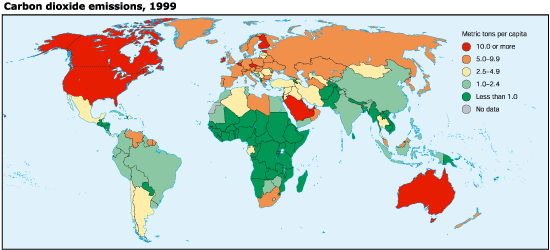
I found an interesting article about the current debate over Nuclear energy. As Nuclear energy is becoming more popular in developing nations (India, China), how should the USA respond? Currently there are over 100 nuclear reactors in the US and they provide roughly 17% of energy on the grid. France has around 60 reactors but they provide more than 70% of the countries energy. Nuclear energy has the potential to provide clean energy in abundance, and combat climate change with zero emissions. The opposition to Nuclear advocates stress on financial risk, and safety as main arguments. Do you think it would be possible to create a policy that effectively reduces financial risk in order to attract American investors to the Nuclear industry? Or a policy that would make the nuclear industry safer? For example, maybe developing a single global reactor fuel supplier to strictly control and regulate the global market. It seems like the turn to prominent nuclear energy use will come as safer technologies emerge, such as meltdown-proof reactors. Citizens will not support nuclear energy until it is safer. Accidents such as Chernobyl, which occurred exactly 24 years ago today, are not worth the health and financial risks. As these risks are mitigated through research, nuclear energy will likely gain public influence. So what should the US do? Compete with the India's and China's of the world in the nuclear industry, or focus on other sources of energy with less initial costs/risks for the future?
http://www.nytimes.com/2010/04/22/business/energy-environment/22NUKE.html?ref=businessspecial2

Nuclear progress is a perfect example of how democracy can slow a nation's development and progress. There are many reasons why nuclear energy would benefit the U.S. and the world - nuclear energy has one of the highest energy contents, meaning essentially, that less 'resource' is used in the production of energy than other energy-producing methods, it is extremely clean in terms of resource extraction all the way through to emission levels, and it is safe (with current technologies and regulations). The list goes on, but the immense benefits of nuclear energy is far outweighed by the fear and negative connotations associated with terms like radiation, fallout, nuclear warfare, and Chernobyl. These are all very real risks but can be seen as 'extreme worst case scenarios' moreso than actual realities. If nuclear public opinion wasnt so frowned upon then nuclear technologies testing wouldnt be so secretative, greenhouse gas emissions would be greatly reduced, and energy security would actually be real, rather than the illusion of it that we possess today.
ReplyDeleteI agree with max in that fear of the worst case scenario (Chernobyl) is really the main reason behind our hesitation for nuclear investment. Although another Chernobyl event is possible, the chances of such an event happening again in the United States is extremely slim. The event that took place in Ukraine happened due to careless regulation of maintenance which led to a lack of water supply and control rods which are needed to keep the reactor stable. An event also happened in the US at 3 mile island. Although there were no injuries or casualties, the scare led to a sweeping change in nuclear regulation. 30 years later reactors in the US are much more advanced and carefully regulated so to avoid such catastrophic incidents. My point is that Nuclear power plants are many times safer than they were 30 years ago and we need to give this energy source another chance.
ReplyDeleteI do believe just as Bob Marley, that nuclear power wont stop the time so lets get invested! If nuclear power had the same percentage of produced energy as France, then the US would decrease its dependency on coal and other natural resources. It there is one upside to nuclear power, it would be that it doesn't emmit any pollution. But I can see the argument for the safety of the plant and for the people living around it, however if there were incentives given to those people to balance the risk of having it, then maybe we could start to build a dependency towards nuclear power.
ReplyDeleteAs I have started to educate myself more about nuclear energy, I have realized that the media, who provides much of the information most people read, has put its own spin on nuclear energy, and often portrays it as a dangerous process. They usually fail to recognize the possibilities it allows for environmental sustainability, but instead report on the few bad things to the extreme. A common trend is that whatever the opinion the media sets out is what its viewers will share -thus creating the negative nuclear energy outlook.
ReplyDeleteI think a big factor in getting more support for nuclear energy would be a shift in attitude of the media to represent both sides, and not just sensationalizing the bad. A good example is this article from the WSJ. http://online.wsj.com/article/SB121432182593500119.html
It is hard to say a country cannot allow itself the capabilities to harness one of the most efficient fuel sources we have. But hard to let countries have this power without any sort of accountability and transparency. Accountability and transparency even in nations that are willing is an almost unsolvable problem.
ReplyDelete